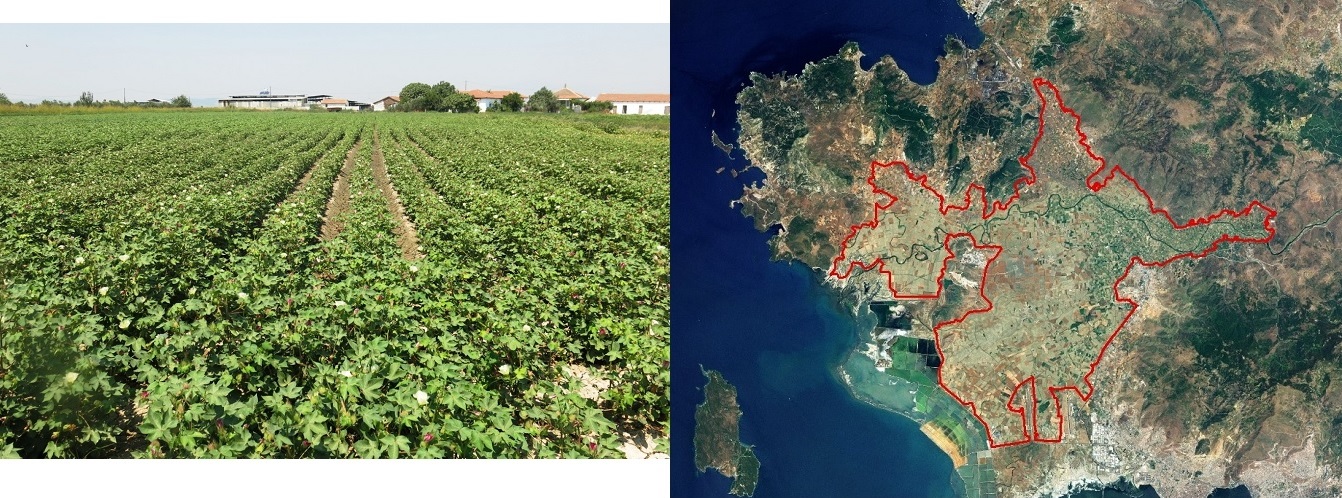Name of Pilot Area: Menemen Plain, Lower Gediz Basin
Country: Turkey
Region: Aegean Region, Izmir
Altitude / Topography: 10m, flat
Climate type: Mediterranean
Average annual rainfall: 540 mm (1954-2014)
Average annual ET: Cotton 560mm, corn 430mm, wheat 460mm.
Challenges: Increasing population pressures on water allocation & demand & increasing pollution. Frequent drought conditions. Risk of water & soil contamination, Groundwater level and water quality problems due to intensive agriculture
User(s): Menemen Irrigation Association; Central government, UTAEM
Pilot focus: VRT for small scale plots
Current situation:
The Menemen Plain in the Lower Gediz River Basin is located in Izmir province. The area is intensively agriculturally used – the main crops are cotton, wine and maize – and irrigated mainly by furrow irrigation. The plain is formed by the material carried by the Gediz river. The layers are not distinctive. Soil is classified into 15 series of entisol and inceptisols. The soil is especially rich in nutrients and productive where there is no drainage problem.
The main challenges are increasing pressure on the water resources and pollution of water and soil. Frequent drought conditions lead to an over-exploitation of groundwater and endanger the income of farmers, who follow a strategy of risk minimization by applying high water and fertilizer dosages.
The average irrigated plot size in the pilot area is small with 1.3 ha. The government has already taken measures to avoid the further splitting of fields.The general strategy of farmers in this region is “risk minimizing” in terms of achieving the desired yield. They do it by “over-fertilizing” and “over-irrigating” as they fear to lose yield. River water from the Gediz river is the main source of water for irrigation. Less than 10% of the plots in the pilot are irrigated with groundwater. Almost all plots (98%) are irrigated with furrow irrigation. Only for vineyards and vegetables drip irrigation systems are installed.


 Morbi porttitor congue felis, a placerat risus finibus et. Vestibulum sollicitudin et risus ut posuere. Quisque mauris elit, mollis nec gravida nec, vehicula ut purus. Sed sodales ipsum vitae mauris efficitur, vel facilisis dui pharetra. Donec ipsum erat, tincidunt vestibulum felis nec, blandit commodo orci. Praesent volutpat lorem ac ex aliquet faucibus. Nam varius vel sapien vitae posuere. Vestibulum luctus facilisis felis nec sodales. Aenean sed tempus arcu. Aliquam fringilla lacus non felis consequat consequat. Mauris purus lectus, luctus at dolor vel, volutpat sodales lorem. Donec congue euismod interdum. Aenean nec convallis sem.
Morbi porttitor congue felis, a placerat risus finibus et. Vestibulum sollicitudin et risus ut posuere. Quisque mauris elit, mollis nec gravida nec, vehicula ut purus. Sed sodales ipsum vitae mauris efficitur, vel facilisis dui pharetra. Donec ipsum erat, tincidunt vestibulum felis nec, blandit commodo orci. Praesent volutpat lorem ac ex aliquet faucibus. Nam varius vel sapien vitae posuere. Vestibulum luctus facilisis felis nec sodales. Aenean sed tempus arcu. Aliquam fringilla lacus non felis consequat consequat. Mauris purus lectus, luctus at dolor vel, volutpat sodales lorem. Donec congue euismod interdum. Aenean nec convallis sem. Lorem ipsum dolor sit amet, consectetur adipiscing elit. Phasellus a nibh at sapien commodo laoreet. Phasellus ut ex dignissim, luctus nibh eget, tincidunt lacus. Nulla vestibulum scelerisque purus non semper. Curabitur id enim vitae dolor sodales molestie nec quis risus. Vestibulum rhoncus tellus nec tortor tincidunt, a bibendum enim tempus. Mauris id lectus in odio dapibus faucibus. Quisque mollis pretium diam, non mattis lorem consequat non.
Lorem ipsum dolor sit amet, consectetur adipiscing elit. Phasellus a nibh at sapien commodo laoreet. Phasellus ut ex dignissim, luctus nibh eget, tincidunt lacus. Nulla vestibulum scelerisque purus non semper. Curabitur id enim vitae dolor sodales molestie nec quis risus. Vestibulum rhoncus tellus nec tortor tincidunt, a bibendum enim tempus. Mauris id lectus in odio dapibus faucibus. Quisque mollis pretium diam, non mattis lorem consequat non.